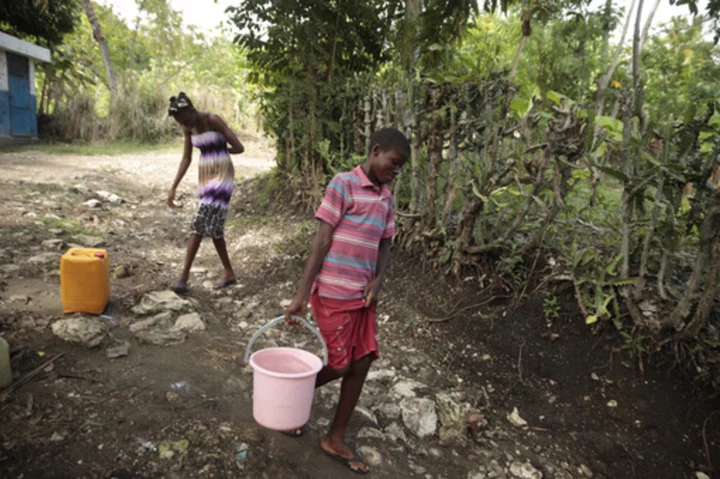SAINT-LOUIS-DU-SUD, Haiti (AP) — Mylouise Veillard was 10 when her mother dropped her off at an orphanage in southern Haiti and promised her a better life. For three years, Mylouise slept on a concrete floor. When she was thirsty, she walked to a community well and hauled heavy buckets of water herself. Meals were scarce, and she lost weight. She worried for her younger brother, who struggled even more than she did at the facility.
It’s a familiar story among the estimated 30,000 Haitian children who live in hundreds of orphanages where reports of forced labor, trafficking, and physical and sexual abuse are rampant. In recent months, Haiti’s government has stepped up efforts to remove hundreds of these children and reunite them with their parents or relatives as part of a massive push to shut down the institutions, the vast majority of which are privately owned.
Social workers are leading the endeavor, sometimes armed with only a picture and a vague description of the neighborhood where the child once lived. It’s an arduous task in a country of more than 11 million people with no residential phonebooks and where many families have no physical address or digital footprint.
“They’re almost like detectives,” said Morgan Wienberg, co-founder and executive director of Little Footprints, Big Steps, one of several nonprofits that help reunite children and families. “It definitely comes down to a lot of persistence.”
The social workers fan out through cities, towns and villages. They walk up hills, navigate mazes of tin-roof shacks and knock on doors. With a smile, they hold up a picture and ask whether anyone recognizes the child.
They find that some orphanages relocated children without notifying their parents, or families were forced to flee violence in their community and lost touch with their kids.
On occasion, social worker Jean Rigot Joseph said he’ll show children pictures of landmarks to see if they remember where they lived. If he locates the parents, he’ll first determine whether they’re open to reunification before revealing he found their child.
Like more than 80% of children in Haiti's orphanages, Veillard and her brother are considered “poverty orphans." Haiti is the poorest country in the Western hemisphere, with about 60% of the population making less than $2 a day. When parents can't afford to feed their children, they temporarily place them in orphanages, where they believe they'll received better care.
“When parents give up their kids to orphanages, they really don’t see it as giving their children up forever,” Wienberg said.
Roughly 30,000 children out of some 4 million nationwide live in about 750 orphanages across Haiti, according to government figures. Many were built after the devastating 2010 earthquake that killed at least 200,000 people. In the months that followed, the number of orphanages in Haiti skyrocketed by 150%, leading to an increase in trafficking, forced labor and abuse.
A 2018 report by Haiti’s Institute of Social Welfare and Research and others found that just 35 of 754 orphanages — less than 5% — met minimum standards and were allowed to operate. Meanwhile, 580 orphanages received the lowest score, meaning the government should order them closed.
In response to the report, Haiti’s government has banned construction of new orphanages and shut down existing ones. But closing orphanages can be dangerous. Government officials have been threatened or forced to go into hiding as owners seek to keep generous donations flowing from abroad; U.S. faith-based donors are the largest funders of orphanages in Haiti, according to Lumos, a nonprofit that works to reunite children in orphanages worldwide with their families.
There is no group or association that speaks on behalf of orphanages in Haiti since the vast majority are individually owned.
Homes are a necessity for children whose parents cannot feed them or protect them from violence, said Sister Paesie, who founded religious organization Kizito Family in Port-au-Prince. It houses and offers free schooling to some 2,000 children from impoverished slums.
“The idea is to remove them from violence,” she said, and parents are invited to visit.
Gangs control up to 80% of Port-au-Prince, according to the U.N., and have been blamed for a surge in killings and kidnappings, especially in areas where children at Kizito Family are from.
Sister Paesie condemned orphanages that are linked to the lucrative adoption business.
“It gives rise to so much abuse instead of trying to help the parents, which we always try to do,” she said.
But reuniting children with parents is hard when they've fled violence and have no home, she said.
“In the last month, I have seen so many mothers sleeping on the streets with their children,” she said. “I have dozens of mothers asking me every single day to take their children because they have no food to give them.”
Reunification efforts have been successful in more rural parts of Haiti where gangs don't have as much control and families can grow their own food.
In rural southern Haiti, some 330 children are now living again with their families. When that day arrived for Mylouise, now 17, and her brother, they were so excited they ran out of the orphanage and left their sandals behind, recalled Renèse Estève, their mother.
They joined Estève, her new partner, their new child and one other sibling in a one-bedroom home by the foot of a mountain where farmers grow corn, potatoes and vetiver, a plant whose oil is used in high-end perfumes.
Wienberg’s nonprofit built Estève the home as part of an effort to help support families after reunification to avoid further economic strain and another separation. Other efforts include hiring an agronomist to help families produce crops to eat or sell amid the crippling inflation that has pushed Haitians into even deeper poverty.
Two of the children sleep on the concrete floor; there are only two small beds in their house. Near the beds, the children keep their only toys: a small stuffed moose and teddy bear, a Hello Kitty purse and a “Black Panther” lunchbox.
Estève said leaving children at the orphanage was painful, even though she visited them occasionally. She didn’t have a job or a partner to help feed and care for them. During their visits, the kids told her they weren't doing well and asked for food. Estève herself struggled to eat at home, thinking of her two children.
“Sometimes I felt like killing myself,” she said.
One day, startled at the weight they'd lost, she decided to pick up the children with the help of social workers. She was convinced they'd be better off in grinding poverty than at the orphanage.
Key to reunification efforts are mentors such as Eluxon Tassy, 32, who works with children living on the street, in orphanages or in transition preparing to return home.
“I understand exactly what they’re going through,” he said.
He was 4 when his mother dropped him off at an orphanage on the outskirts of Port-au-Prince, where he lived for nearly 15 years. He said he also was forced to spend two years with a family that exploited him as a child domestic worker, known in Haiti as a restavek. He never went to school despite promises from the family to enroll him in exchange for cleaning the house and tending to farm animals.
Tassy's first priority when helping children navigate the transition back home is gaining trust and building confidence. He uses art and music, singing the alphabet with the younger ones. He asks how they feel about their orphanage but is careful not to question them too much.
Sometimes he has to explain the concept of a family and the importance of affection if a child doesn’t remember his parents or has spent much time away from them.
In Estève’s case, her children reconnected almost immediately with her. To celebrate, she cooked two meals that day: the traditional Haitian spaghetti breakfast, and later, rice and beans laden with a fish sauce.
“It was easy,” she said. “We were a family again.”









